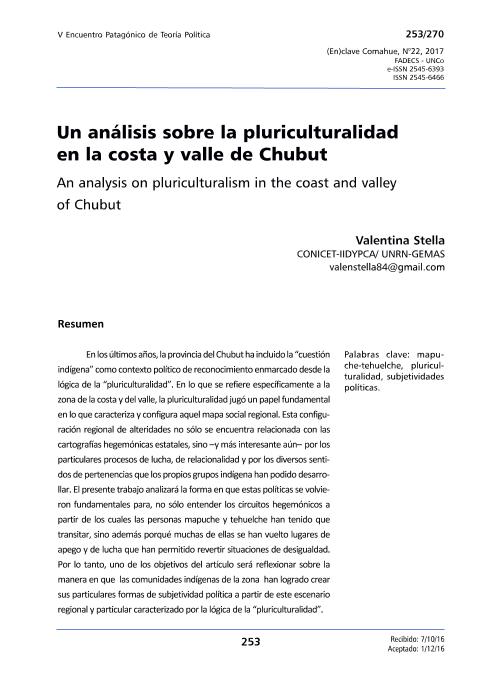Mostrar el registro sencillo del ítem
dc.contributor.author
Stella, Valentina

dc.date.available
2018-09-06T19:16:08Z
dc.date.issued
2017-04
dc.identifier.citation
Stella, Valentina; Un análisis sobre la pluriculturalidad en la costa y valle de Chubut; Universidad Nacional del Comahue. Facultad de Derecho y Ciencias Sociales; (En)Clave Comahue; 22; 4-2017; 253-269
dc.identifier.issn
2545-6466
dc.identifier.uri
http://hdl.handle.net/11336/58593
dc.description.abstract
Enlosúltimos años,laprovinciadelChubutha incluidola “cuestión indígena” como contexto político de reconocimiento enmarcado desde la lógica de la “pluriculturalidad”. En lo que se refiere específicamente a la zona de la costa y del valle, la pluriculturalidad jugó un papelfundamental en lo que caracteriza y configura aquelmapa socialregional. Esta configuración regional de alteridades no sólo se encuentra relacionada con las cartografías hegemónicas estatales,sino –y másinteresante aún– porlos particulares procesos de lucha, de relacionalidad y por los diversos sentidos de pertenencias que los propios gruposindígena han podido desarrollar. El presente trabajo analizará la forma en que estas políticasse volvieron fundamentales para, no sólo entender los circuitos hegemónicos a partir de los cuales las personas mapuche y tehuelche han tenido que transitar, sino además porqué muchas de ellas se han vuelto lugares de apego y de lucha que han permitido revertir situaciones de desigualdad. Por lo tanto, uno de los objetivos del artículo será reflexionar sobre la manera en que las comunidadesindígenas de la zona han logrado crear sus particulares formas de subjetividad política a partir de este escenario regional y particular caracterizado porla lógica de la “pluriculturalidad”.
dc.description.abstract
In recent years, the province of Chubut has included the “indigenous question” as a political context for recognition, framed in the logic of “pluriculturalism”. As it relates specifically to the area of the coast and valley, this pluriculturalism played a key role in what characterizes and shapes that regional social map. This regional configuration of otherness not only is related to hegemonic state cartographies, but also –an even more interestingly– to the particular processes of struggle, relationships and senses of belonging that the indigenous groups themselves have been able to develop. This work analyzes how these policies became fundamental not only to understand the hegemonic circuits which the Mapuche and Tehuelche peoples have had to cope with, but also the reasons why many of them have become places of attachment and struggle that allowed reversing situations of inequality. Therefore, one of the objectives of this paper will be to reflect on how indigenous communities in the area have created their particular forms of political subjectivity from this particular regional scenario characterized by the logic of “pluriculturalism”.
dc.format
application/pdf
dc.language.iso
spa
dc.publisher
Universidad Nacional del Comahue. Facultad de Derecho y Ciencias Sociales
dc.rights
info:eu-repo/semantics/openAccess
dc.rights.uri
https://creativecommons.org/licenses/by-nc-sa/2.5/ar/
dc.subject
Mapuche-Tehuelche
dc.subject
Pluriculturalidad
dc.subject
Subjetividades Políticas
dc.subject
Políticas Indígenas
dc.subject.classification
Otras Sociología

dc.subject.classification
Sociología

dc.subject.classification
CIENCIAS SOCIALES

dc.title
Un análisis sobre la pluriculturalidad en la costa y valle de Chubut
dc.title
An analysis on pluriculturalism in the coast and valley of Chubut
dc.type
info:eu-repo/semantics/article
dc.type
info:ar-repo/semantics/artículo
dc.type
info:eu-repo/semantics/publishedVersion
dc.date.updated
2018-09-04T18:36:01Z
dc.identifier.eissn
2545-6393
dc.journal.number
22
dc.journal.pagination
253-269
dc.journal.pais
Argentina

dc.journal.ciudad
Neuquén
dc.description.fil
Fil: Stella, Valentina. Consejo Nacional de Investigaciones Científicas y Técnicas. Centro Científico Tecnológico Conicet - Patagonia Norte. Instituto de Investigaciones en Diversidad Cultural y Procesos de Cambio. Universidad Nacional de Río Negro. Instituto de Investigaciones en Diversidad Cultural y Procesos de Cambio; Argentina
dc.journal.title
(En)Clave Comahue
dc.relation.alternativeid
info:eu-repo/semantics/altIdentifier/url/http://revele.uncoma.edu.ar/htdoc/revele/index.php/revistadelafacultad/article/view/1532
Archivos asociados
